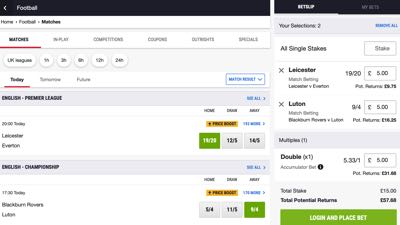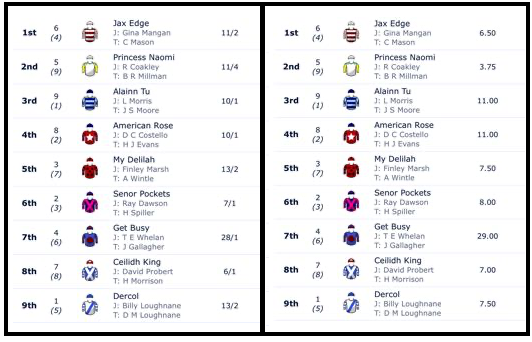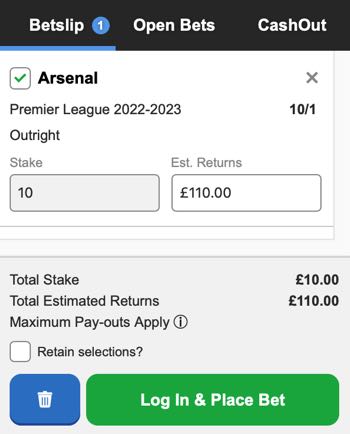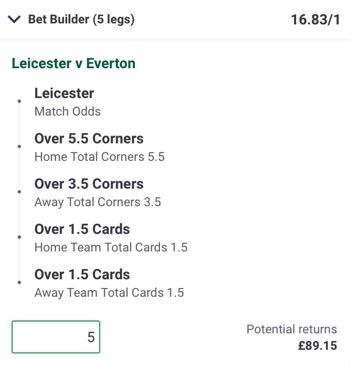 For many people, betting can be a fun way to make games, matches, race, tournaments and the many other things you can wager on more exciting. It should always be seen as a bit of fun and you should only ever bet what you are comfortable losing (because, let’s be honest here, there’s a fair chance you will lose). If you do win some cash, that’s a bonus, and if you stick to this very simple principle, you can wager with affordable stakes and enjoy it if your horse surges to the line to win by a nose or your favourite striker lands your first goalscorer bet.
For many people, betting can be a fun way to make games, matches, race, tournaments and the many other things you can wager on more exciting. It should always be seen as a bit of fun and you should only ever bet what you are comfortable losing (because, let’s be honest here, there’s a fair chance you will lose). If you do win some cash, that’s a bonus, and if you stick to this very simple principle, you can wager with affordable stakes and enjoy it if your horse surges to the line to win by a nose or your favourite striker lands your first goalscorer bet.
But, of course, before all of that you need to know how to bet and get to grips with the basics of online betting. If you have never made a bet before but want to know how to, or simply just want to know a little bit more about betting online, we’ve got everything you’ll need right here. We’ll take you from betting novice to, well, not quite betting pro, but someone who understands the key aspects and fundamentals of betting.
Where to Bet: Finding a Betting Site
In order to place a bet online, you’re going to need a betting site. Rather than confuse you with a big list of potential bookies, we’re going to keep things simple and stick to our number one favourite site.
They’re a great option for both total novices and experienced punters alike and offer a one stop shop for pretty much anything you want to bet on. Plus, there’s a pretty generous welcome bonus – what more could you want.
If you want more recommendations then you can see our full top 10 list here.
Understanding Odds: What You Pay & What You (Might) Get
The starting point for betting is the odds and these can certainly be confusing to a total newcomer to the world of gambling. Before you place a bet, you quite simply have to understand betting odds. The odds can be viewed as the price when you buy something, indeed, another word for odds is the price. If you buy a TV for £500 you understand your outlay and what you will get for it.
Odds are slightly more complicated, but they are not at all confusing, really. They simply describe how much you stand to win from a bet – in other words, what you will pay and what you (might) get. There are different odds formats in the same way that half a cake is the same as 50% of a cake is the same as ½ a cake is the same as 0.5 of a cake. These are just different ways of saying the same thing and when it comes to odds, in the UK you will see either fractional odds or decimal odds used.
Fractional vs Decimal Odds

Fractional vs Decimal Odds
Fractional odds are the more traditional format in the UK, though over the past 20 years, decimal odds have become more common. All of the best online betting sites allow you to choose which format you want the odds displayed in, usually under settings or “My account”. A good starting point with odds is the concept of evens, or even money. In fractional odds this is technically 1/1, though you will probably just see, or hear, it referred to as evens. In decimal odds this is 2.00.
Selections priced at evens are thought to have around a 50% chance of winning and your stake, the amount you risk, is the same as your potential winnings. A £1 bet at evens returns £2 – your £1 stake plus £1 in winnings.
We can see here how the odds formats work, because decimal prices indicate what you get back from the bookie, whilst fractional ones show your winnings (excluding the stake) based on a given bet. Decimal odds of 2.00 mean that you will get £2 back from a £1 winner, whilst fractional odds (1/1) mean that if you bet £1, your winnings (over and above your stake) will be £1.
Odds lower than evens, or 2.00, are called odds-on, and indicate that the selection is thought to have a very decent chance of winning. Odds of 1.50 mean that if you bet £1 you will get £1.50 back (including your £1 stake) and thus be 50p to the good. In fractional prices, this is written as 1/2, which means that if you bet £2, your winnings would be £1 (and you’d get £3 back in total) or, of course, if you bet £1, you would be 50p up and get £1.50 back in total.
In summary, with decimal odds, the stated number is what you would get back in total from a £1 bet. Of course, you can bet more or less than that if you want and then just multiply or divide to calculate your returns. With fractional odds, the number on the left is what your winnings will be and the number on the right is your stake. As such, 6/4 means that a £4 bet will yield winnings of £6 and a return of £10 (as you get your stake back on winning bets). This is the same as 2.50 in decimal pricing.
For reference, the table below shows some comparisons of the two formats. We have also included the implied probability. In simple terms, this converts odds into probability and shows what chance a selection at such a price has of winning. Note, however, that bookies include a margin in their odds (basically offering lower odds than the true probability), so if the implied probability is 50%, the pick might only really have a 46% chance of success.
| Decimal Odds | Fractional Odds | Implied Probability |
|---|---|---|
| 1.20 | 1/5 | 83.3% |
| 1.80 | 4/5 | 55.6% |
| 2.00 | 1/1 | 50% |
| 4.00 | 3/1 | 25% |
| 8.50 | 15/2 | 11.8% |
| 21.00 | 20/1 | 4.8% |
Placing a Single Bet
 Now that you understand how odds work and what the (sometimes seemingly random) numbers mean, you might well want to know how to actually place a bet. Placing an online bet is easy – after all, bookies want you to do it and so they make it as simple as possible. A good place for any newcomer to start is a single, the most basic type of bet which just involves one prediction. This could be a team to beat another (in any sport), a golfer to win a tournament, a cricketer to get the top score in a match, a horse to win a race or anything else.
Now that you understand how odds work and what the (sometimes seemingly random) numbers mean, you might well want to know how to actually place a bet. Placing an online bet is easy – after all, bookies want you to do it and so they make it as simple as possible. A good place for any newcomer to start is a single, the most basic type of bet which just involves one prediction. This could be a team to beat another (in any sport), a golfer to win a tournament, a cricketer to get the top score in a match, a horse to win a race or anything else.
The exact process varies between sites but generally the following steps should get your bet on for you:
- Locate Event – This can be done using either a search tool (look for a bar or magnifying glass icon) or via the sport, with sports often listed in the sidebar on the left. Using the second method, sub-menus should take you to the right country, league or event, then a specific match if required.
- Select Market – Some sports and matches have hundreds of different markets, such as football. Others, such as greyhound racing, have just a handful. The search tool may allow you to go straight to the market you want to bet on. Otherwise use the different menu tabs and sub-menus to find the market you want.
- Choose Selection – Once you have found the sport, event, match and market you want, you need to make your pick. You should see all the possible outcomes and the odds for each. Click on the odds and this will usually add that selection to the betting slip.
- Open Betting Slip – The betting slip should become apparent once you add a selection but, if not, it is usually in the top right of the screen. Here you will see your pick and the event. Check these details are correct.
- Enter Stake & Confirm – Enter your stake. This should then trigger “potential return”, showing you what you stand to win. Again, check this is all correct and then click place bet, or confirm, or however it is worded. There may be a second confirmation button so make sure you click this if necessary.
Once you have done this you should see some form of confirmation, perhaps a short message stating that your wager is live. There should be a reference (usually a long number or mix of numbers and letters) but you can also double-check your bet under your live bets or account.
Accumulators & Multiple Bets
 Simple singles give you the best chance of beating the bookies in the long term. However, many punters love the high risk, high reward of accumulators, or accas, and other multiples bets that involve a number of different selections. Like the lottery, you know your chances of winning are small, but the opportunity to land a huge win from a small stake is what makes these bets so popular.
Simple singles give you the best chance of beating the bookies in the long term. However, many punters love the high risk, high reward of accumulators, or accas, and other multiples bets that involve a number of different selections. Like the lottery, you know your chances of winning are small, but the opportunity to land a huge win from a small stake is what makes these bets so popular.
Some do not class a double as an acca but we would argue it is the simplest of all the accumulators. A double involves picking two unrelated selections where both must win for your bet to be a winner. You have a single stake covering both selections (also called legs, or predictions): if both win, your wager is successful, otherwise you lose your entire stake.
An example of a double might be Big Duncan to win the 1.30 at Ripon and Amokachis Llamas to win the 1.50 at Newmarket. With an acca the winnings and stake rollover from one leg to the next, with the potential returns accumulating. If, for example, you place a £10 double as above and both horses were favourites at even money (that is, evens, 1/1 or 2.00), your total returns would be £40. Those two picks at evens effectively combine to create a bet of 3/1 (or 4.00).
This is because the initial £10 bet becomes £20 when and if Big Duncan does the business. You then have £20 at evens on Amokachis Llamas, with this bet, if successful, seeing you win £20 plus get that £20 stake for a total of £40.
However many legs are in an acca they work in the same way. So, for example, if you added a third horse, to make a treble, and that was also at evens, your returns would be £80 if all three horses won. As noted though, if just one of those horses failed to win, you lose your bet. Obviously, the more legs you include, the bigger your returns but the more likely it becomes that one or more of the picks will let you down.
Multiples
Multiples bets are slightly more complex and come in a wide range of forms. These take several selections, like an acca, but rather than just one bet where they all have to win, you have multiple wagers that combine these selections.
One popular multiple, loved by racing fans but also used on football and other sports, is a Lucky 15. Here you have four legs, so these could be four horses in separate races, four Premier League teams to win their respective games on a Saturday or even a mix-and-match selection of four different markets and sports.
The Lucky 15 includes 15 separate wagers across these four picks and, as such, a £1 Lucky 15 will set you back £15. The 15 bets are:
- 1 Acca – All four legs must win.
- 6 Doubles – Every possible double using the four selections and at least two picks must win.
- 4 Trebles – With four legs there are four trebles that can be made and you need at least three of your legs to win to land any of them.
- 4 Singles – Bets on each leg separately: if one wins, you get a return but only one of your 15 bets will be successful.
There are almost countless different multiples available starting with three selections, going up to six, seven or even more. You can have multiples that include singles, like the Lucky 15, or ones that don’t – a Yankee is identical to a Lucky 15 but is just 11 bets because you aren’t backing each leg as a single. There are also far more complex and unusual multiples, though many of these are not generally offered online.
How to Place a Multiple or an Acca
To place an acca or other multiple just add the selections you want to include to your betting slip. Our favourite online betting sites make placing these bets very simple and so once you have done that the betting slip will show the various options.
Let’s say you fancy a bet on the football and add four home wins to your betting slip. The slip will typically show each selection available to back as a single. Underneath that, depending on the bookie, you might see the following options listed:
- Doubles (6 bets)
- Trebles (4 bets)
- Yankee (11 bets)
- Lucky 15 (15 bets)
- Fourfolds (1 bet)
The site lists all the possible multiples they offer and to place your bet you just enter a stake in the relevant box. If you decide that you want to back just the trebles, adding £10 to the stake box here would see a total wager of £40. The potential returns will also be shown, though this will be based on all four legs winning, and therefore all four trebles.
What Happens If You Win?

If you land a winner, your returns will be automatically calculated and paid into your betting account balance. Bets are usually settled very quickly once an event has ended, or sometimes even once that particular market has reached its conclusion. For example, if you back a horse to win a race and it does, the funds should be with your online betting account within a few minutes of the race ending. Back a game to see over 2.5 goals and the cash could be there in the first half if it is a goalfest.
There can sometimes be delays to this process for a range of reasons but normally bets are settled and the bookie stumps up within about 10 minutes. If they don’t, or you think the amount paid is incorrect, it might be worth double-checking a few things, for example:
- Did you make the correct bet, confirm it fully and place the stake you intended to?
- Did the bet definitely win? A goal may have been changed to an own goal, not one for the striker you backed, you may have counted a certain stat wrong during a match, or there may be a dead heat or Rule 4 deduction (we have separate articles on these), for example.
- Was the match completed fully?
- Was the bet voided (see below for more info)?
If you still think there is an issue do not panic or fret, simply contact the bookie. Live chat is best, or calling, as then you can get a quick answer. They may be able to correct the error if there is one or explain why you haven’t been paid, or why you have received less than you had expected.
Once the correct amount is in your online betting account you then just have to decide what to do next. Winnings will not automatically be withdrawn back to your card or other deposit method so you can leave them with the bookie or your next bet if you want. If you want to get your hands on the loot head to “My account” and then withdraw. You can withdraw some or all of the funds, subject to any minimum or maximum restrictions. The money can be back in your bank within seconds, though it may sometimes take a few days.
Void Bets

Bets can be voided for a whole host of different reasons. These are some of the most common:
- Match Postponed, Cancelled or Abandoned – This could be due to the weather, a date change, trouble off the pitch or one of many other reasons.
- Bookie Made an Obvious Error – If the bookie makes what is technically called a palpable error, they can void the bet. For example, if they price Ronnie O’Sullivan at 8/1 and the world number 598 at 1/10, it is obvious they have got the odds the wrong way round and they are entitled to void the bet. Other examples of this include accepting a bet after the game has begun or after a market has been settled.
- Tie/Draw – Some sports and markets may mean that a tie or draw is possible but this outcome is not always available to bet on. Where this is the case the bet is a push (or a void).
- Non-Runner – If your horse is a late non-runner and you made the bet on the day (or at least not ante post) then it will be a void bet. The same applies in other sports where a player you backed to score or be involved in some other way does not play, or sometimes start.
In an ideal world, if a bet is made void, the bookie will notify you as soon as possible, though this depends on the circumstances. For example, we would not expect them to confirm that a horse was a non-runner, but we would hope they would say they have cancelled a bet due to their error in accepting it.
In reality, no matter what the reason for the bet being made void, the chances are you will not be told about it. Instead, the stake will simply be returned to your betting account. Depending on the circumstances the bet may show as void under either settled bets or void/cancelled ones, or it may even disappear entirely.
Can You Cancel a Bet?

It is always best to work on the basis that you will not be able to cancel a bet. As such, check very carefully when placing the wager that the match, date, market, selection and stake are correct. However, should you make a mistake, or simply change your mind, there might be something you can do.
Bookies will look at this on a case-by-case basis but your best chance of them allowing you to cancel, or rather edit, a bet, occurs when you have made an honest mistake – and it sounds genuine. For example, if you backed a horse to win and meant to back it each way, they may allow this as it is entirely plausible and, moreover, you still want to make a bet.
In contrast, if you ask to cancel a bet entirely, just after it has been announced that the side you backed will be without their star player, you are unlikely to have any joy. In general, the sooner you notify a bookie of a mistake the better, especially if the odds are the same as when you made the bet. In addition, always be polite and ask nicely!
Cash-Out Option
The other option is to see if the bookie offers cash out. This tool allows you to close bets early by accepting an agreed cash-out value. Cash out can be used in-play or pre-match and depending on the status of the game in relation to your bet, the value of the cash out might be a small fraction of your stake, or not far shy of the full potential returns if you had allowed the bet to stand.
The best online bookmakers will usually allow you to cash out for the full value of your stake pre-match if the odds remain unchanged. Essentially, this means you can cancel a bet. Some sites will offer a cashout of perhaps 95% of the stake though, even if the price is the same as when the bet was struck.
Betting with Free Bets

One of the best things about making a bet with a new site is that you are highly likely to be eligible for some form of welcome bonus. Such promos sweeten the deal considerably for us punters. That said, there are a few things that you need to be aware of when placing a bet with bonus funds.
Ultimately, it is a simple case of reading the terms and conditions of the promo. Bookies are not trying to trick you up but they have to have some key terms to protect themselves. The most important info about the offer will usually be shown on any banner or promo material you see for it. It is important you adhere to these terms if you don’t want to miss out. As well as the various eligibility requirements and timeframes to stick to, you should also look for the following:
- Minimum and maximum odds for qualifying bets and free ones
- Restricted sports or markets
- Must the bet be in-play, pre-match, a betbuilder, an acca, or something else?
- Any wagering requirements before you can withdraw
It is also very important to be aware that the chances are the free bet itself will not be included with returns. Most freebies are classed as “stake not returned”, meaning that the free bet value will not be given back to you. As such, a free bet of £20 at odds of 3/1 (4.00) will see £60, not £80, returned to your balance.
One other thing to note is that many welcome offers include terms stating that in the event of a void the free bet will not be re-credited. In our experience, many sites will manually reinstate the bonus funds if you end up missing out, for example if a horse you backed with the freebie is a non-runner.
That said, they do not have to, and for this reason there are certain markets and situations where using a welcome bonus or offer may not be best practice. Backing a horse that likes fast ground when rain is forecast would be one example, whilst betting on a lower league game when snow and ice are forecast is another. Equally betting on markets such as the goalscorer options in football before the team is announced can be a risk.
Why Hasn’t Your Bet Paid Out? Common Mistakes to Watch Out For

We have touched on this already (see the What Happens If You Win? and also the Void Bets sections above). However, there are so many potential reasons why a bet that you thought was a winner might not be, or that the balance of your account is lower than you were expecting.
We listed Did the Bet Definitely Win? above, and one issue here may be that you have misunderstood the market. To betting novices knowing how to place a bet is one thing but understanding the hundreds of different markets available is quite another. Handicaps can be particularly confusing, especially those that include a half goal, or two separate figures (split handicaps), or Asian handicaps that allow a tie (meaning a void bet and your stake returned).
As noted earlier, if you do not think your situation is covered by any of the issues mentioned, the bookie is always the best port of call. Chances are, though, that either you, or they, have simply made an honest mistake and a quick chat can rectify the situation.

